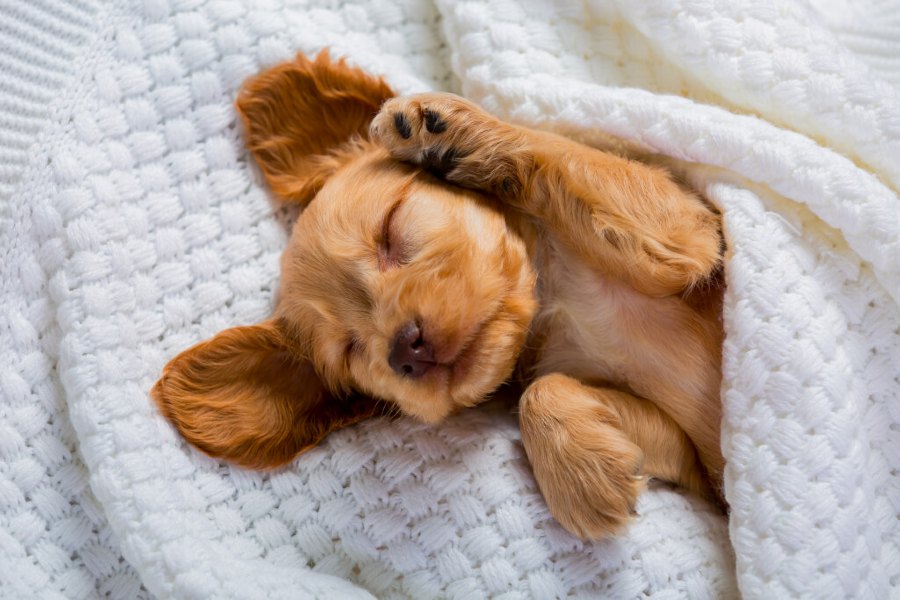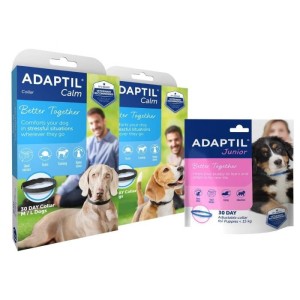Getting a new puppy is very exciting, but it does not come without its challenges. No matter how prepared you may think you are, you are bound to face some difficulties, and there’s lots to remember! Take a look at our handy new puppy checklist to make sure you’re all set for your furry new arrival, and read on for some top tips that will make it easier for your new puppy to settle in.
The first few months are the most crucial when it comes to caring for and training a puppy, so these top tips could really come in useful!
New Puppy Checklist: What do I Need for a New Puppy?
Before you bring your new puppy home, there are a few essentials you’ll need to hand.
Here’s what to buy for a new puppy:
- Bed and blankets
- Toys (including chew toys)
- Water and food bowls
- Food storage (that your pup can’t get into!)
- Complete puppy food
- Training treats
- Collar and tag (these are legal requirements for dogs when they are in a public space)
- Lead and harness
- Puppy pads and poo bags
- Grooming brush
- Dog toothpaste and brush
- Dog shampoo
- Carpet cleaner
You’ll also need to have made some preparations at home. Before your pup arrives, make sure you’ve ticked everything off the following new puppy checklist:
- Puppy-proof your home!
Make sure your home is dog-friendly by removing or concealing anything that could cause harm such as cables, cleaning products and electricals. You may also want to add stair gates or baby gates to limit access to areas your puppy shouldn’t go in. - Set up a secure base for your new puppy
Having a safe space complete with a comfortable bed and plenty of blankets is essential for keeping your new puppy warm, safe and comfortable. Some people use a crate to achieve this, but you could also use playpens or baby gates. - Allocate an eating area
Your new puppy’s eating and drinking areas should not be in the same place as their sleeping space. - Secure your garden
Outdoor play is very important for your new puppy’s development as well as for toilet training purposes, so make sure there are no escape routes such as a gap in a fence, and ensure your garden is free of any toxic plants. - Sign up for essential services
Your new puppy is going to need a vet, pet insurance, and a groomer, and maybe puppy training classes, a dog sitter, and a dog walker too. Be sure to research and sign up to all those relevant to you and your pup. - Update your puppy’s microchip details
Find out if your puppy is microchipped. If they are, then make sure the details have been changed from the breeder’s details to your details on the microchip database. Keep these details up to date throughout the dog’s life.
First 48 Hours with a New Puppy
Show them the essentials
When you first bring home your new puppy, it’s important to make your new fur baby feel safe and comfortable. Show them their bed and food/water bowls right away so they know where the important things are. Then introduce them to other key areas gradually – but don’t overwhelm them by taking them into lots of different rooms in the first couple of days.
Keep introductions minimal
It’s also really important that everyone in your household stays calm when your new puppy first comes home. Too much excitement could overwhelm them, so it’s best to only introduce them to the members of the household in those first few days, and save visits from friends until they have gotten more used to their new home.
Bond with your new puppy
Having said this, spending lots of time together is key so that your new puppy knows they can feel safe around you. You’ll also need to keep an eye on them so you can offer them lots of toilet time. Just be sure not to exhaust your pup – playtime is great, but you may find they need to sleep a lot too.
Stick to the rules
Introducing any ground rules you might have right away is a great way to set a precedent and ensure that your puppy will learn them quickly. For example, are there some rooms your pup can’t go in? Are they allowed on the sofa? Consistency is key in this regard – make sure everyone in your home knows what the rules are and sticks to them, otherwise it can be confusing for your new puppy.
Should I Ignore My Puppy Crying at Night?
No, particularly in the first few nights after bringing your new puppy home, we would not recommend ignoring them if they cry or bark. It’s ok to comfort them!
It’s a scary and confusing time for a puppy to be away from mum for the first time, and ignoring them when they are distressed will make them feel even more frightened and isolated.
Instead, they should be taught how to be independent at night slowly, so it’s fine to comfort them until they get more confident.
Toilet Training
It’s a good idea to toilet train your new puppy as soon as possible. Take your puppy out first thing in the morning for a toilet break and encourage them to poo and wee outside. It’s best to let your puppy out in the garden without a lead on as it’s too restrictive, however if you’re worried your puppy could escape, an extendable lead is a good solution.
Stay outside with your new puppy until they have done their business at which point you can give gentle praise. Avoid leaving your puppy outside in the hope that they will eventually go to the toilet. If they still haven’t gone to the toilet after five minutes, come back inside the house, but keep a very close eye on them. Repeat this process 10 minutes later (and 10 minutes after that if they still haven’t gone) and hopefully your puppy will eventually toilet in the right place. It can be a slow process but your patience will pay off!
Like small children, puppies have small bladders, so expect a few accidents in the first few months. If your new puppy does have an accident in the house when you’re not looking, just clean it up calmly. If you catch your puppy in the middle of going, quietly pick them up and pop them outside to see if they can finish what they started in the right place.
It’s best not to leave your puppy alone, but if you do have to go out, then leave them in the area that they are most comfortable, making sure they have had the chance to exercise and go to the toilet beforehand. Just in case your puppy needs to go to the toilet while you’re out, you should designate a specific area, lining it with newspaper or puppy training pads. Ideally, this spot should be near the back door or wherever else you let them outside.
Familiarise Your New Puppy with Being Handled
As much as we would like to, we can’t cuddle pups all day, however it is important you spend some time handling your new puppy so that they don’t get a shock when it’s time for a groom or a trip to the vets.
Ensuring that you stroke them, as well as touching their paws, head and ears, at least once a day will make them more accepting of it.
It’s also a good idea to start brushing their teeth early (between the ages of 8 and 16 weeks). Using one hand, gently lift the upper lip so you can get to the teeth and gums. Start by brushing the molars inside and out, covering both sides top and bottom.
There are a range of dog toothbrushes and dog toothpastes you can buy that are suitable for puppies. Never use human toothpaste on your dog; while dog toothpaste is specially created with tasty flavours and designed to be ok to swallow, human toothpaste is not appealing to your pup flavour-wise, and is designed to be spat out rather than swallowed.
Remember to closely supervise your new puppy when around children as their attitude towards ‘handling’ may not be as gentle as yours, and your puppy might be less patient.
Introduce Your Puppy to New Dogs
It goes without saying that your puppy should not come into contact with other dogs until they have had all of their vaccinations, but after that, the more socialisation the better!
The earlier you socialise your new puppy with other dogs, the more sociable they will be, which can reduce your anxiety when it comes to walking your dog at the park or on the beach.
Begin with other dogs whose temperament you know well, such as close friends and family pets, or in a controlled environment, such as puppy classes.
Many veterinary practices run puppy classes, in which owners can bring their puppies to socialise in a safe, supervised and controlled environment. Alternatively, you can ask your vet for specific advice on training and socialising your new puppy.
Reward Good Behaviour
It’s important that your new puppy learns what good behaviour is as soon as possible, so you should not delay in rewarding them for doing something that pleases you (such as sitting on command, waiting for food, using the designated toilet area, etc). This will help them to associate such behaviour with positive outcomes, meaning they are likely to continue to do it.
These rewards should not always be in the form of treats, but perhaps some fuss or a new toy.
Practice Separation
Young puppies should not be left alone for too long, but you are going to need to go out to work etc, so it is important that they are happy to do their own thing when you are not around.
Using a baby gate so that your new puppy can’t always follow you is a great way to create some separation between you in your home. Ensure you leave them in a cosy area and consider offering them food-dispensing toys to keep them occupied. When they’re sleeping and content, stay away or go into a different room for a while. When they’re concerned, return. Gradually build up the time they are left alone. This teaches your puppy that it is ok to be left alone, and that you are going to return.
If you’re worried your puppy is struggling with anxiety, toys and calming supplements (based on natural proteins or pheromones), collars or home diffusers can help reduce feelings of stress. All of these products can be used together if needed.
In spite of the challenges that a new puppy can bring, seeing them grow into a well-behaved and happy dog is one of the most rewarding processes!
Ensure you register your new puppy with your local vet for routine vaccinations and discussions about neutering. If at any time you’re unsure about your puppy’s health, do not hesitate to seek advice from your vet as soon as possible.
Animeddirect.co.uk has a range of puppy products and food, as well as low-cost wormers and flea treatments.
References: Blue Cross

